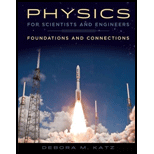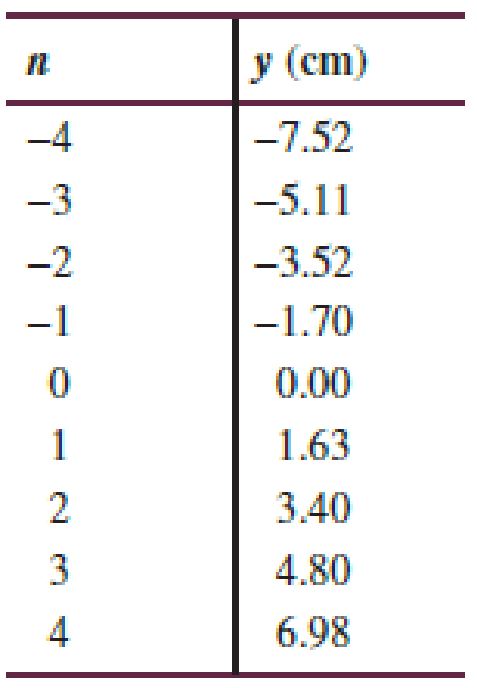
Physics for Scientists and Engineers: Foundations and Connections
1st Edition
ISBN: 9781133939146
Author: Katz, Debora M.
Publisher: Cengage Learning
expand_more
expand_more
format_list_bulleted
Concept explainers
Textbook Question
Chapter 35, Problem 81PQ
Table P35.80 presents data gathered by students performing a double-slit experiment. The distance between the slits is 0.0700 mm, and the distance to the screen is 2.50 m. The intensity of the central maximum is 6.50 × 10−6 W/m2. What is the intensity at y = 0.500 cm?
TABLE P35.80

Expert Solution & Answer
Want to see the full answer?
Check out a sample textbook solution
Students have asked these similar questions
The table contains data obtained during the single-slit microwave experiment with a slit width of 7 cm and a wavelength of 2.8 cm. To compare data like this with theory in Sec. 8.5, you will have to normalize both the intensity and the angular data. A. What is the normalized intensity I/I0 at 40∘?
B. What is the normalized angle β/π at 25∘?
Q1/ A/ Consider a resonator consisting of two concave spherical mirrors both with radius of curvature 4 m and separated by a distance of 1 m. Calculate the minimum beam diameter of the TEMy mode at the resonator center and on the mirrors when the laser oscillation is Art laser wavelength 2=514.5 nm. Then, Find if this cavity is stable or not. B/ One of the mirrors in A is replaced by a concave mirror of 1.5m radius of curvature, calculate the position of minimum beam radius. Then calculate the beam waist and radius of curvature at 150 cm from M1.
Diffraction can be used to provide a quick test of the size of red blood cells. Blood is smeared onto a slide, and a laser shines through the slide. The size of the cells is very consistent, so the multiple diffraction patterns overlap and produce an overall pattern that is similar to what a single cell would produce. Ideally, the diameter of a red blood cell should be between 7.5 and 8.0 μm. If a 633 nm laser shines through a slide and produces a pattern on a screen 24.0 cm distant, what range of sizes of the central maximum should be expected? Values outside this range might indicate a health concern and warrant further study.
Chapter 35 Solutions
Physics for Scientists and Engineers: Foundations and Connections
Ch. 35.1 - Perhaps Newton never observed a diffraction...Ch. 35.1 - Prob. 35.2CECh. 35.2 - Prob. 35.3CECh. 35.3 - Prob. 35.4CECh. 35.4 - When we studied Youngs double-slit experiment, we...Ch. 35.6 - Prob. 35.6CECh. 35 - Light Is a Wave C As shown in Figure P35.1, spray...Ch. 35 - Sound Wave Interference Revisited Draw two...Ch. 35 - Prob. 3PQCh. 35 - You are seated on a couch equidistant between two...
Ch. 35 - Prob. 5PQCh. 35 - Prob. 6PQCh. 35 - A student shines a red laser pointer with a...Ch. 35 - Monochromatic light is incident on a pair of slits...Ch. 35 - Prob. 9PQCh. 35 - In a Youngs double-slit experiment with microwaves...Ch. 35 - A beam from a helium-neon laser with wavelength...Ch. 35 - Prob. 12PQCh. 35 - Prob. 13PQCh. 35 - Prob. 14PQCh. 35 - Light from a sodium vapor lamp ( = 589 nm) forms...Ch. 35 - Prob. 16PQCh. 35 - Prob. 17PQCh. 35 - Prob. 18PQCh. 35 - Prob. 19PQCh. 35 - Prob. 20PQCh. 35 - Prob. 21PQCh. 35 - Prob. 22PQCh. 35 - Prob. 23PQCh. 35 - Figure P35.24 shows the diffraction patterns...Ch. 35 - Prob. 25PQCh. 35 - Prob. 26PQCh. 35 - A thread must have a uniform thickness of 0.525...Ch. 35 - Prob. 28PQCh. 35 - Prob. 29PQCh. 35 - A radio wave of wavelength 21.5 cm passes through...Ch. 35 - Prob. 31PQCh. 35 - Prob. 32PQCh. 35 - A single slit is illuminated by light consisting...Ch. 35 - Prob. 34PQCh. 35 - Prob. 35PQCh. 35 - Prob. 36PQCh. 35 - Prob. 37PQCh. 35 - Prob. 38PQCh. 35 - Prob. 39PQCh. 35 - Prob. 40PQCh. 35 - Prob. 41PQCh. 35 - Prob. 42PQCh. 35 - Prob. 43PQCh. 35 - Prob. 44PQCh. 35 - Prob. 45PQCh. 35 - Prob. 46PQCh. 35 - Prob. 47PQCh. 35 - Prob. 48PQCh. 35 - Figure P35.49 shows the intensity of the...Ch. 35 - Prob. 50PQCh. 35 - Prob. 51PQCh. 35 - Prob. 52PQCh. 35 - Light of wavelength 750.0 nm passes through a...Ch. 35 - Prob. 54PQCh. 35 - Prob. 55PQCh. 35 - Prob. 56PQCh. 35 - Light of wavelength 515 nm is incident on two...Ch. 35 - Light of wavelength 515 nm is incident on two...Ch. 35 - A Two slits are separated by distance d and each...Ch. 35 - Prob. 60PQCh. 35 - Prob. 61PQCh. 35 - If you spray paint through two slits, what pattern...Ch. 35 - Prob. 63PQCh. 35 - Prob. 64PQCh. 35 - Prob. 65PQCh. 35 - Prob. 66PQCh. 35 - Prob. 67PQCh. 35 - Prob. 68PQCh. 35 - Prob. 69PQCh. 35 - Prob. 70PQCh. 35 - Prob. 71PQCh. 35 - Prob. 72PQCh. 35 - Prob. 73PQCh. 35 - Prob. 74PQCh. 35 - Prob. 75PQCh. 35 - Prob. 76PQCh. 35 - Prob. 77PQCh. 35 - Another way to construct a double-slit experiment...Ch. 35 - Prob. 79PQCh. 35 - Prob. 80PQCh. 35 - Table P35.80 presents data gathered by students...Ch. 35 - Prob. 82PQCh. 35 - Prob. 83PQCh. 35 - Prob. 84PQCh. 35 - Prob. 85PQCh. 35 - Prob. 86PQCh. 35 - Prob. 87PQCh. 35 - Prob. 88PQCh. 35 - A One of the slits in a Youngs double-slit...Ch. 35 - Prob. 90PQ
Knowledge Booster
Learn more about
Need a deep-dive on the concept behind this application? Look no further. Learn more about this topic, physics and related others by exploring similar questions and additional content below.Similar questions
- In a double slit experiment, the distance between the slit is 1 mm and screen is 25 cm away from the slits. The wavelength of light is 6000 Å. The width of the finge on the screen isarrow_forwardIn a Young's double-slit experiment, the separation between slits is d and the screen is a distance R from the slits. R is much greater than d and > is the wavelength of the light. The number of bright fringes per unit width on the screen is: d/RX R/dλ Rd/λ X/Rd Rλ/darrow_forwardConsider a light wave passing through a slit and propagating toward a distant screen. Figure P37.53 shows the intensity variation for the pattern on the screen. Give a mathematical argument that more than 90% of the transmitted energy is in the central maximum of the diffraction pattern. Sugges- tion: You are not expected to calculate the precise percent- age, but explain the steps of your reasoning. You may use the identification 1 1 8 Imax asine -3T -27 -T 27 37 A Figure P37.53 ||arrow_forward
- The table contains data obtained during the single-slit microwave experiment with a slit width of 7 cm and a wavelength of 2.8 cm. To compare data like this with theory in Sec. 8.5, you will have to normalize both the intensity and the angular data. a) What is the normalized intensity I/I0 at 40∘? b)What is the normalized angle β/π at 25∘?arrow_forwardWhen an x-ray beam is scattered off the planes of a crystal, the scattered beam creates an interference pattern. This phenomenon is called Bragg scattering. For an observer to measure an interference maximum, two conditions have to be satisfied: 1. The angle of incidence has to be equal to the angle of reflection. 2. The difference in the beam's path from a source to an observer for neighboring planes has to be equal to an integer multiple of the wavelength; that is, 2d sin(0) = mx for m = 1, 2, .... The path difference 2d sin(0) can be determined from the diagram (Figure 1). The second condition is known as the Bragg condition. Figure 1 of 1 d sine d sine Review nstants Part A An x-ray beam with wavelength 0.260 nm is directed at a crystal. As the angle of incidence increases, you observe the first strong interference maximum at an angle 20.5 °. What is the spacing d between the planes of the crystal? Express your answer in nanometers to four significant figures. VE ΑΣΦ ? d = nm…arrow_forwardMonochromatic light of wavelength 475 nm from a distant source passes through a slit that is 0.0300 mm wide. In the resulting diffraction pattern, the intensity at the center of the central maximum (θ = 0∘) is 9.60×10−5 W/m^2 . a. What is the intensity at a point on the screen that corresponds to θ = 1.20∘.arrow_forward
- In an interference arrangement similar to Young's double-slit experiment, the slits S₁ and S₂ are illuminated with coherent microwave sources, each of frequency 106 Hz. The sources are synchronized to have zero phase difference. The slits are separated by a distance d = 150.0m. The intensity I (0) is measured asarrow_forwardLight of wavelength λ = 580 nm is incident upon two thin slits that are separated by a distance d = 25 μm. The light hits a screen L = 1.5 m from the screen. It is observed that at a point y = 5.5 mm from the central maximum the intensity of the light is I = 55 W/m2. What is the intensity of the light at the two slits (I0) in watts per square meter?arrow_forwardChapter 35, Problem 019 Suppose that Young's experiment is performed with light of wavelength 497 nm. The slits are 1.74 mm apart, and the viewing screen is 4.51 m from the slits. How far apart are the bright fringes in meters? Number Units Use correct number of significant digits; the tolerance is +/-2%arrow_forward
- Q. 17 : In a double slit experiment, the distance between the slit is 1 mm and screen is 25 cm away from the slits. The wavelength of light is 6000 Å . The width of the finge on the screen is (a) 0.15 mm (b) 0.24 mm (c) 0.30 mm (d) 0.12 mmarrow_forwardProblem 2. A) A Michelson interferometer uses light of wavelength 500 nm. The irradiance of the beam exiting the laser is IL. What are the possible differences in the lengths of the arms of the interferometer when the irradiance at the detector is IL/3? B) Young's Double slit experiment is performed with HeNe laser wavelength 632.8 nm. The screen is 2 m from the slits and the slit separation is 0.2 mm. Find the distance of the 3th bright fringe from the center of the interference pattern on the screen (call the central bright fringe the "Oth" fringe).arrow_forwardQ/4 : In Biprism experiment the fringe width is 0.30 mm. If slits are covered by glass plate of thickness 0.04 mm and refractive index u = 1.5, then the fringe width is (a) 0.02 mm (b) 0.1 mm (c) 0.30 mm (d) 0.2 mmarrow_forward
arrow_back_ios
SEE MORE QUESTIONS
arrow_forward_ios
Recommended textbooks for you
 Physics for Scientists and Engineers: Foundations...PhysicsISBN:9781133939146Author:Katz, Debora M.Publisher:Cengage Learning
Physics for Scientists and Engineers: Foundations...PhysicsISBN:9781133939146Author:Katz, Debora M.Publisher:Cengage Learning Principles of Physics: A Calculus-Based TextPhysicsISBN:9781133104261Author:Raymond A. Serway, John W. JewettPublisher:Cengage Learning
Principles of Physics: A Calculus-Based TextPhysicsISBN:9781133104261Author:Raymond A. Serway, John W. JewettPublisher:Cengage Learning

Physics for Scientists and Engineers: Foundations...
Physics
ISBN:9781133939146
Author:Katz, Debora M.
Publisher:Cengage Learning

Principles of Physics: A Calculus-Based Text
Physics
ISBN:9781133104261
Author:Raymond A. Serway, John W. Jewett
Publisher:Cengage Learning
Spectra Interference: Crash Course Physics #40; Author: CrashCourse;https://www.youtube.com/watch?v=-ob7foUzXaY;License: Standard YouTube License, CC-BY